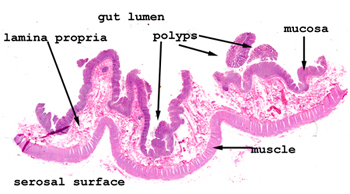
General
and Systemic Histopathology, C601&C602
Slide 21: Familial polyposis of the
colon.
 |
The changes are subtle
here. You really must look at the tissue on the slide before going
to the microscope. You will see little areas of thickening of the mucosa
and that's about it. In some areas there may even be a polypoid formation
but the earliest changes are not easy to see.
See this slide with the
virtual microscope.
|
 |
This slide shows the
subtle changes in the bowel mucosa that can lead to big troubles later.
You will need to be on low power to initially identify the mucosal areas
of abnormality. Once you go to higher power, note the "branching" margins
of the glands of the polyps and the "piling up" of the epithelium. You
should have no trouble finding mitotic figures even though these lesions
are benign. This congenital condition often leads to cancer of the colon
later in life. Cancers of glandular origin are called adenocarcinomas,
and frequently have histologic patterns similar to the organ in which they
arose. To reemphasize the point, however, what we are looking at here is
benign. |
Back
to Home
|